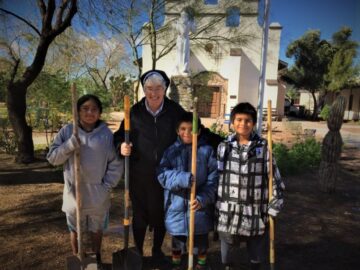Franciscan Sisters of Christian Charity feature the song Declaración del domicilio by Eduarda Meana.
Music and Lyrics by Eduardo Meana; English translation of lyrics provided by Sister Marie Kolbe Zamora Declaration of domicile_for FSCC_ENG.
Sister Marie Kolbe Zamora, serving at the General Secretariat of the Synod, comments on the song and its use during the meeting at Frascati to draft the Document for the Continental Stage of Synod 2021-2024.
The song is entitled Declaración del domicilio and was used at Frascati during the morning prayer led by Latin America (Venezuela, Perú, Brazil). They explained that declaring one’s domicile is an important civil, legal act whereby you inform the government of your residence. The Christian artists who composed this song have produced a bit of a faith/beatitude manifesto regarding their (the Christian) “place of residence” among all God’s people. It is a beautiful song, entirely missional, a bit heartbreaking in a few spots. Don’t let the Spanish be an obstacle to enjoying a lovely bit of peaceful music and some beautiful images. Do enjoy an extra contemplative moment today if you can!
 The continental phase of the Synod follows and builds on the consultation of the faithful conducted by Bishop’s Conferences around the world. The task of this continental phase is to continue the listening and discerning begun in the Bishop’s Conferences. Those present at the Continental Meetings will generate a new Synthesis to be presented to the first Assembly of the Synod of Bishops (October 2023) for their discernment. For current updates on the Synod, click here. To read the working document for yourself click here: https://www.synod.va/content/dam/synod/common/phases/continental-stage/dcs/Documento-Tappa-Continentale-EN.pdf
The continental phase of the Synod follows and builds on the consultation of the faithful conducted by Bishop’s Conferences around the world. The task of this continental phase is to continue the listening and discerning begun in the Bishop’s Conferences. Those present at the Continental Meetings will generate a new Synthesis to be presented to the first Assembly of the Synod of Bishops (October 2023) for their discernment. For current updates on the Synod, click here. To read the working document for yourself click here: https://www.synod.va/content/dam/synod/common/phases/continental-stage/dcs/Documento-Tappa-Continentale-EN.pdf
“Globally, participation exceeded all expectations. In all, the Synod Secretariat received contributions from 112 out of 114 Episcopal Conferences and from all the 15 Oriental Catholic Churches, plus reflections from 17 out of 23 dicasteries of the Roman Curia besides those from religious superiors (USG/UISG), from institutes of consecrated life and societies of apostolic life, and from associations and lay movements of the faithful. In addition, over a thousand contributions arrived from individuals and groups as well as insights gathered through social media thanks to the initiative of the “Digital Synod.”’


